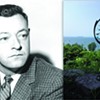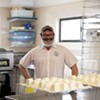Published October 26, 2005 at 4:00 p.m.
James Bond liked his martini shaken, not stirred. Today's cocktail connoisseurs have many more choices: Gin or vodka? Infused or flavored? Chocolate or apple? Here's a new one: Now you can order that lemongrass gingertini with organic vodka made in Vermont.
Since last November, two guys in Stowe have been distilling an enlightened version of America's best-selling spirit using midwestern organic corn and Vermont Pure spring water. Down the road, the local liquor store now sells more Green Mountain Sunshine Vodka than Stoli, Absolut and Grey Goose combined. It's also the "bartender's choice" at the Four Seasons Hotel in San Francisco.
Tim Danahy, 44, and 37-year-old Howie Faircloth III brewed beer together at The Shed for eight years before they decided to start a craft distillery in a nondescript building off Route 100 -- "definitely the cheapest rent in Stowe," Danahy notes. The two men handle every aspect of the business, from saccharification, in which starches are converted to fermentable sugars, to drumming up sales.
Since Prohibition, the liquor industry has been dominated by big distilleries. That's changing. What happened to micro brews and boutique wine is now happening to spirits. Ten years ago, there were 15 small "craft" distilleries in America; today there are 66, according to a recent Associated Press article. Not to be outdone, Pete's Wicked Ale, Anchor Steam and Sierra Nevada are positioned to branch out from beer to booze.
Why aren't there more mom-and-pop distilleries? "It's so hard to get into," Danahy says with a groan. It took Green Mountain Distillers three grueling years to get through the federal certification process -- longer than the oak-cask aging for the company's forthcoming organic whisky. The specter of organized crime still looms over the industry. Danahy and Faircloth had to undergo extensive background checks.
Their bank account, too, was scrutinized, but neither knows exactly what the federal agent was looking for: "We asked him, 'What should the balance be?' He wouldn't say," Danahy recalls. Arbitrariness and illogic apparently work to keep unsavory characters out of the distilling business: "If they don't like you," Danahy surmises, "they can turn you down."
Larger forces also sabotaged Danahy and Faircloth. They were two years into the certification process, and just a week away from getting the green light, when terrorists attacked New York City in 2001. The federal Alcohol, Tobacco and Firearms agent assigned to their case was suddenly working for Homeland Security. "One day our guy was certifying distilleries. The next day he was crawling through dynamite caves on the Canadian border," Danahy recalls with a big smile. "That stretched it out an extra year."
Meanwhile, in a classic catch-22, the Sunshine boys couldn't get a sales commitment from their only local customer, the state of Vermont, until they had a license to make booze. As the sole supplier of liquor in the Green Mountains, Vermont marks up every bottle it buys from manufacturers -- 45.5 percent, in the case of Sunshine -- and distributes it to retail outlets that sell on its behalf. Places such as Burlington's Pearl Street Beverage pocket between 6 and 7 percent of the purchase price. Twenty-five percent goes into the state's general fund, and the balance finances the activities of the Department of Liquor Control. The state's gross annual liquor sales last year came to $50,343,841.
The feds get a big piece of the action, too. For every gallon of liquor they distill, Green Mountain pays $13.50 to the U.S. government. Not surprisingly, Uncle Sam takes an active interest in the company's comings and goings. Breaking into a distillery is a federal offense -- and almost impossible, since every window is secured on the inside with a 2-by-4. Only three people have keys to the government-mandated padlocks on the exterior doors at Green Mountain Distillers: Danahy, Faircloth and the gun-toting federal agent.
"They can come in any time," Danahy says, noting he's required to leave the company books in plain sight when he goes home at night. "If your papers aren't in order, they'll close you right down."
Luckily, it only takes a week to make quadruple-distilled vodka. When they finally got licensed and certified organic and the feds had approved the label, Danahy and Faircloth cooked up and sold 100 cases in the first two weeks. The state has been buying about 1200 bottles a month consistently over the past year. "They've been great to us," Danahy claims. Vermont's official product-description list enthuses about this "small-batch domestic vodka handcrafted in Stowe." It recommends, "Serve chilled straight, on the rocks or with your favorite fruit juice or soda."
Just don't expect to get a taste at the plant. You can find everything but samples at the 1500-square-foot distillery, which looks more like the inside of a very clean garage: big plastic jugs, tools, plastic tops, wax-filled crock pots, copper wire and a stainless steel condenser bought at auction from the now-defunct Tunbridge Quality Ales.
On the wall opposite the front door, above the modern bottling machine, hangs the old still Faircloth inherited from his moonshine-making grandfather in Baltimore. Those Prohibition stories are "one of the reasons I got into the industry," he says. Along with the still, his grandfather, who's since passed away, also gave him a case of shotgun shells. Faircloth recalls the encounter. "He said, 'Now that you have the still, you'll need these.'"
All you need is a valid ID to order up a little Sunshine at Stowe Beverage on the Mountain Road. The green-and-gold etched bottle is prominently displayed on a floor-to-ceiling wall of vodkas. It looks homespun, but definitely legit alongside the Absoluts, Stolies and Finlandias. A tower of unopened cases stacked up nearby suggests it's also the vodka of choice in Stowe. The store goes through 500 bottles a month at $22.40 per.
None of the other 73 Vermont liquor stores moves quite that much organic alcohol, but Green Mountain Sunshine is making serious inroads at local restaurants. It's the house vodka at the Round Barn in Waitsfield. A Single Pebble, Church Street Tavern and Vermont Pub & Brewery are all serving it. So is
Smokejacks, known for its martini menu. "The fact that it's a Vermont product is 75 percent of it," says Smokejacks owner Leslie Myers. "And it's a very good product, so it's easy for us to sell." She points out that getting a toehold in the market isn't easy when you're up against big distributors with regional reps and people who "default to Absolut or Grey Goose."
"It's up to us to create a demand," Danahy observes, noting a wine-selling friend has helped place the product in California, to the tune of 50 cases a month. Green Mountain Sunshine is the house vodka at San Francisco's Slanted Door. The Four Seasons gives it top billing on the vodka page of its extensive drink menu. Danahy says they were shaking it up with organic honey and serving it with a sidecar of carrot and apple juice for 11 bucks. Vodka martinis there sell for $13.
The critics at Sante, a magazine for restaurant professionals, remarked, "Aromas of lemon, lime and vanilla on the nose lead to flavors of lemon, lime and pine," in a recent review of the product. "Firm, with nice smoothness; long finish with just the slightest tinge of heat."
"They have us in the 'neat' category," Danahy observes. "That's good."
True enough. A swig of unadulterated Sunshine goes down easy without a trace of burn. You can make vodka from anything that ferments -- grain, potatoes, fruit, even milk -- but in this case the sweetness derives from the organic corn, supplied by a 200-member farmer co-op in Minnesota. Danahy and Faircloth tried -- and failed -- to find a local supplier.
"What really matters is that they're following the proper agricultural practices," Faircloth says of the suppliers. "Taking care of family farmers, that sort of thing. And, it tastes great."
Now that the vodka is generating regular cash flow, Danahy and Faircloth are ready to start experimenting with other spirits. They've got a single-malt whisky aging in a room next to the still. It will be the "first organic whisky anywhere in America," Faircloth promises. They also have plans for maple-flavored rum and perhaps an organic Vermont apple brandy.
The expectation is that with booze going boutique, palates will rise to the occasion, as they have with innovations in wine and beer. If a vodka martini is not your deal, at the very least, "We would hope you'd mix ours with something organic," Faircloth says. Could be hard times ahead for mainstream mixers such as ginger ale, 7-Up and Coke.
More By This Author
Speaking of Food, Underlines
-

Q&A: Howard Fisher Delivers Meals on Wheels With a Side of Good Cheer
Dec 20, 2023 -

Video: Howard Fisher Delivers Meals on Wheels
Dec 14, 2023 -

Q&A: Alexis Dexter Rescued 57 Shelter Cats During the July Flood
Sep 13, 2023 -

Video: Two Months After the Flood, Alexis Dexter Rebuilds Kitty Korner Café in Barre and Continues to Rescue Cats
Sep 7, 2023 -

Video: Saying Goodbye to Burlington’s Penny Cluse Café
Nov 17, 2022 - More »
Comments
Comments are closed.
From 2014-2020, Seven Days allowed readers to comment on all stories posted on our website. While we've appreciated the suggestions and insights, right now Seven Days is prioritizing our core mission — producing high-quality, responsible local journalism — over moderating online debates between readers.
To criticize, correct or praise our reporting, please send us a letter to the editor or send us a tip. We’ll check it out and report the results.
Online comments may return when we have better tech tools for managing them. Thanks for reading.














































